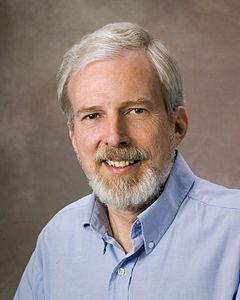
Conceptual Road Blocks to Common Sense

Conceptual Road Blocks to Common Sense

WHAT: Second Order Science
WHEN: Tuesday, Jan. 10, 2012, 5:30 – 8:00 p.m.
While Café Scientifique events are usually held on the first Tuesday of each month, please note that this event will take place on the second Tuesday due to the holiday.
WHERE: The Front Page restaurant, near Ballston Metro.
Located at 4201 Wilson Blvd., Arlington, VA 22203 on the ground floor of the National Science Foundation (NSF) building. Parking is available under the NSF building or at Ballston Common Mall.
WHO: Presented by Stuart Umpleby, Professor of Management, The George Washington University.
HOW: Please come early to order table service and socialize. Special half-price burgers start at 5:30 p.m. Presentation begins at 6:15 p.m. followed by Q&A. No science background required – only an interest! Café Scientifique is free and open to the public. Registration requested. Register online now.
ABOUT THE TOPIC: In the social sciences it is clear that theories affect the phenomenon being studied. Indeed, we create theories in the hope that they will be accepted, acted upon and the social system will perhaps function better. However, usually scientific research is based on the assumption that the theory does not affect the phenomenon. The result is a gap between our assumptions about social systems and the way we do research. Closing this gap is leading to new methods for both research and practice. Creating a second order science, which includes examining the effects of theories on phenomena, is presently impeded by logical difficulties involving self- reference. This problem can be solved by reinterpreting some parts of mathematics using ideas common in everyday life.
SUPPORT THIS CAFÉ: The Ballston Science and Technology Alliance, a nonprofit organization, is the sponsor of Café Scientifique Arlington. Since April 2006, the goal of Café Scientifique has been to make science more accessible and accountable by featuring speakers whose expertise spans the sciences and who can talk in plain English. Please go to www.arlingtonvirginiausa.com/
See Also:
2012 Reflexivity = Integrity: Toward Earth/Life 4.0

We Asked For Water, They Gave Us Gasoline
ROBERT HUNZIKER
Counterpunch, Weekend Edition 6-8 Jan 2012
According to worldwide energy industry participants, all of the low hanging fruit is gone. Finding new energy sources will henceforth be difficult and expensive… and very dangerous to your health. The unquenchable thirst for energy is unique to modern man, a little over 100 years old, and energy is unquestionably the heartbeat of modern civilization. We cannot exist without it, but where and how to find it is fast becoming the biggest challenge to the health of planet earth. Case in point: Fracking is the fastest growing segment of the energy industry, massively so in North America, but it may be the death knell of society well before global warming has the opportunity to really strut its stuff.
According to Texas Governor Rick Perry, when confronted on the campaign trail about fracking problems: “We have been using hydraulic fracturing in my home state for years and this is a fear tactic that the left is using and the environmental community is using that absolutely, excuse the pun, does not hold water.”
Governor Perry’s bias and ill-founded statement is herein refuted by 12 personal testimonials in Texas included in the appendix to this article. Further, it is well understood by professionals who seriously follow the trails and tribulations of fracking that almost all cases where fracking has poisoned ground water are quickly settled, payoffs to the victims, by energy lawyers who arrange for the legal documents to be sealed. The implication herein is we do not know the whole story by a long shot, but knowing the whole story may be the only way to survive as a species. Why we don’t know all the facts should be one of the most important political questions of 2012.
Phi Beta Iota: Fracking poisons clean water. Tar sands are flushed with clean water. There is plenty of energy in the USA, the KEYSTONE/Tar Sands and fracking are scams–lies to the public–intended to feed refineries in the US for the EXPORT of processed fuels. The public desperately needs a government capable of combining intelligence with integrity. Fracking also causes earthquakes, as recently occurred in Ohio. Anyone who does not know all this is NOT qualified to run for President, Senator, or Representative. In our humble opinion.

For anyone wondering how the abandonment of the dollar reserve status would look like we have a Hollow Men reference: not with a bang, but a whimper… Or in this case a whole series of bilateral agreements that quietly seeks to remove the US currency as an intermediate. Such as these: “World's Second (China) And Third Largest (Japan) Economies To Bypass Dollar, Engage In Direct Currency Trade“, “China, Russia Drop Dollar In Bilateral Trade“, “China And Iran To Bypass Dollar, Plan Oil Barter System“, “India and Japan sign new $15bn currency swap agreement“, and now this: “Iran, Russia Replace Dollar With Rial, Ruble in Trade, Fars Says.” And ironically, the proposal to dump the greenback did not come from Iran. Per Bloomberg: “Iran and Russia replaced the U.S. dollar with their national currencies in bilateral trade, Iran’s state-run Fars news agency reported, citing Seyed Reza Sajjadi, the Iranian ambassador in Moscow. The proposal to switch to the ruble and the rial was raised by Russian President Dmitry Medvedev at a meeting with his Iranian counterpart, Mahmoud Ahmadinejad, in Astana, Kazakhstan, of the Shanghai Cooperation Organization, the ambassador said.” Is Iran gradually becoming the poster child of an energy rich country that just says no to the dollar: “Iran has replaced the dollar in its oil trade with India, China and Japan, Fars reported.” Next thing you know China, Russia and Japan will engage in bilateral trade agreements with the Eurozone in exchange for purchasing European or EFSF (which at last check are now forced to give 30% guaranatees) bonds, and bypassing dollars completely. But yes, aside from everyone else, virtually everyone (footnote 1) is still using the dollar as currency of global exchange.

A few weeks back I put my intention out to open a Beacon Collaboratory, or what I called in the blog post a “Superhero School.” As I look around me, I’m seeing a pattern of convergence towards these kinds of live/work/play spaces. As “living labs,” these spaces bring together elements of a tech incubator, an R&D facility, a hackerspace/fablab, a sustainability demonstration site, and it’s all tied to place – with the projects / prototypes / experiments being done there carried out and implemented in the local area, stimulating the economy, creating jobs, and building resilient communities throughout the area and the region.
I’ve been over to the dream property four times now, and each time I go it seems I have a clearer sense of how the whole thing could work.
I can see it as being an innovation hub and retreat center, wrapped in a creative learning culture. Just 90 minutes by train from NYC, a welcome change of scenery for Silicon Alley.
As ‘collaboratory’ is defined as a “center without walls,” it could be a second home to a lot of different change agent organizations. For instance, Hub could have a presence there, COMMON could launch some socially conscious enterprises there, Open Source Ecology might build some equipment there, and a hacker collective could run a bootcamp there. There could be programs for teaching kids to code, mentorships with high school students to guide them from idea incubation to entrepreneurship, and events around any number of topics, like arts and culture, technology, business, sustainability, or spirituality.
At any rate, I wanted to do a bit of a deep dive to find existing examples of these types of things around the world, and was pleasantly surprised to find hundreds.

Dear friends,
Robert Steele, a long-time colleague of mine and presidential hopeful with the Reform Party (see PS below), has just become the second politician to sign the Co-Intelligence Institute's Politician's Pledge http://bit.ly/SteelePledge. This pledge commits the politician to take seriously any properly convened and facilitated citizens deliberative council – to post its results on their website and either follow its recommendations or publicly say why they can't or won't.
This seemingly low-commitment pledge – which requires nothing from the politician except an authentic respect for a legitimate voice of We the People (as described in my post yesterday) – has been declined by a number of politicians. The only politician to sign it in the past was leading Hawaii Democratic state Senator Les Ihara http://1.usa.gov/LesIhara back in 2004.
Given that we are entering a major election year and the phraseS “the people” and “we the people” are being tossed around a lot, I invite you to consider asking the candidates seeking your support if they will sign the Politician's Pledge and, if they decline, asking them why not.
Imagine if a few dozen politicians in the U.S. elections – and elsewhere where elections are going on – why, imagine if a few hundred or a few thousand signed the Politician's Pledge…. Suddenly there would be a political “market” for citizen panels of all kinds – Citizens Juries, Consensus Conferences, Wisdom Councils…. And if a leading candidate made a big deal about their willingness to listen to the authentic, thoughtful voice of We the People and challenged their opponents to do the same, it just might become hard for other candidates to resist signing the Pledge.
And when 20% or 40% or 60% of the politicians signed the pledge – I mean, why not dream big!? – then suddenly the people would have a powerful voice to speak through, to make a difference, to get their collective wisdom pushed into political conversations and public policy. And suddenly the ball would be in our court. It would be up to us to convene the citizen panels that would tell the politicians what to do. And if we did they, the onus would be on them to do what we said. And if they didn't, I suspect there would be other politicians ready to say that they would.
And after a while, it would make little difference which party a candidate was from, because the standard by which they were all being judged was how well they honored and supported the informed, thoughtful, creative will of We the People.
Think about it.
C'mon. Dream with me. Below you'll find the pledge and the original “Listen to the People's Wisdom” campaign, for your consideration and enjoyment.
Coheartedly,
Tom
PS: Robert Steele's campaign http://bigbatusa.org (he's planning to hit a home run) is focusing on Electoral Reform, a Balanced Budget (don't presume you know what that means until you see the specifics), True Cost Economics (one of the highest leverage approaches to transforming the economic system), and a Coalition Cabinet (no matter what your politics are, you'll probably be boggled in both directions by the diverse people Steele is proposing for his cabinet). I have any number of concerns about a number of his proposals, but in a sense that's almost irrelevant. I mean, I've never seen a candidate I didn't have *some* real concerns about. And his platform is one of the most radical I've seen and he's determined to push these potent ideas into the political conversation. I had issues with him calling his campaign “We the People” because all the ideas in his platform are his and his advisors', rather than coming from citizen deliberative councils. But now that he's signed the Politician's “Listen to the People” Pledge, I feel he can make that claim. If he got enough support, he'd probably drum up a few CDCs just so he can play out his Pledge. He's a bit wild, I must admit, but he's extremely high integrity and very dedicated. Take a look and see what you think….
==========

SwiftRiver Throws a Lifeline to People Drowning in Information
There's a problem that constantly plagues us in this day of information overload, and that is the ability to sift the stream of incoming information into the bits that are valuable from those that aren't. It's a tough issue that we've been working on at Ushahidi for a while now. Our solution is called SwiftRiver.
SwiftRiver is a free and open-source intelligence platform that helps people curate and make sense of large amounts of information in a short amount of time. In practice, SwiftRiver enables the filtering and verification of real-time data from channels such as SMS, email, Twitter and RSS feeds. It's especially useful for organizations that need to sort their data by their unique expectations of authority and accuracy, as opposed to popularity. Such organizations include journalists, community based-groups, PR/marketing, emergency responders, election-monitoring groups, and more.
Phi Beta Iota: This was one of many things the US Intelligence Community was told it needed (by the Advanced Information Processing and Analysis Steering Group (AIPASG). N-GRAMS was a good start, but the various individuals in charge of the respective Directorates did not want to collaboration and were afraid of what they did not understand. The $80 billion a year we waste on secret intelligence will be an excellent bill-payer when the US public finally elects a government that can combine intelligence with integrity.